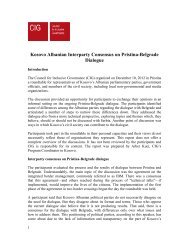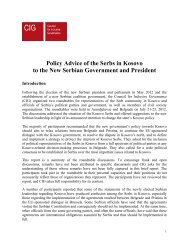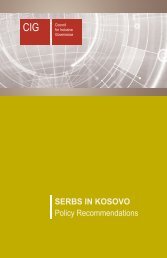Searching for Solutions for Kosovo's North (ENGLISH) - Cigonline.net
Searching for Solutions for Kosovo's North (ENGLISH) - Cigonline.net
Searching for Solutions for Kosovo's North (ENGLISH) - Cigonline.net
You also want an ePaper? Increase the reach of your titles
YUMPU automatically turns print PDFs into web optimized ePapers that Google loves.
the understanding of those whose remarks have not been fully captured in<br />
this brief report. The participants took part in the roundtable in their personal<br />
capacities and their positions do not necessarily reflect those of organizations<br />
they represent. The participants have not reviewed the report, and CIG takes the<br />
responsibility <strong>for</strong> its content.<br />
Introductory Arguments<br />
Two analysts from Belgrade and Pristina opened the roundtable. They offered<br />
an overview of the relations between Belgrade and Pristina and an analysis<br />
of the current situation in the north. The Belgrade participant addressed the<br />
relationship between economic hardships and political extremism. A weak<br />
economy, characterized by extreme levels of unemployment—about 45 percent<br />
in Kosovo and 20 percent in Serbia—is affecting not only the lives of Serbs and<br />
Albanians, but also the political positions of Belgrade and Pristina. He argued<br />
that in times of economic hardship clinging to nationalism is the best bet by the<br />
elites to extend their stay in power and deflect public attention from real issues.<br />
Both Belgrade and Pristina confront budget deficits, weak economic growth,<br />
widespread corruption, and organized crime. He suggested that Belgrade and<br />
Pristina should begin genuine cooperation and not only do so when pressured<br />
by the international community.<br />
Regarding the crisis in the north of Kosovo, the speaker said that the dispute<br />
is not only between Belgrade and Pristina but also between Belgrade and the<br />
Serbs in the north, between Pristina and those Serbs, between Belgrade and the<br />
international community, and between Pristina and the international community.<br />
Belgrade should support solutions that benefit both Serbs in the north and those<br />
in the south, the speaker added. He also cautioned against “criminalizing” the<br />
barricades in the north. “While some people at the barricades may be criminals,<br />
the problem is real.” According to his argument, the source of the problem is<br />
not lawlessness; lawlessness is simply the result, not the cause, of the dispute.<br />
Neither Belgrade nor Pristina can function and make any progress with such<br />
constant political and security risks. President Tadic’s call <strong>for</strong> the removal of the<br />
barricades was not considered serious by some actors because, reportedly, there<br />
were measures taken by Serbian officials that prevented the implementation<br />
of the President’s message. The speaker concluded that the government of<br />
Kosovo has reaped some benefits from this situation, mostly because it did not<br />
act, benefiting from this inaction.<br />
The analyst from Pristina refuted the commonly heard argument that Serbs and<br />
Albanians cannot live together. “It doesn’t make a lot of sense to say that Serbs<br />
can’t live together with Albanians in Kosovo but other ethnic groups in other<br />
countries can—<strong>for</strong> instance, Albanians in Serbia and Macedonia, Russians in<br />
6





